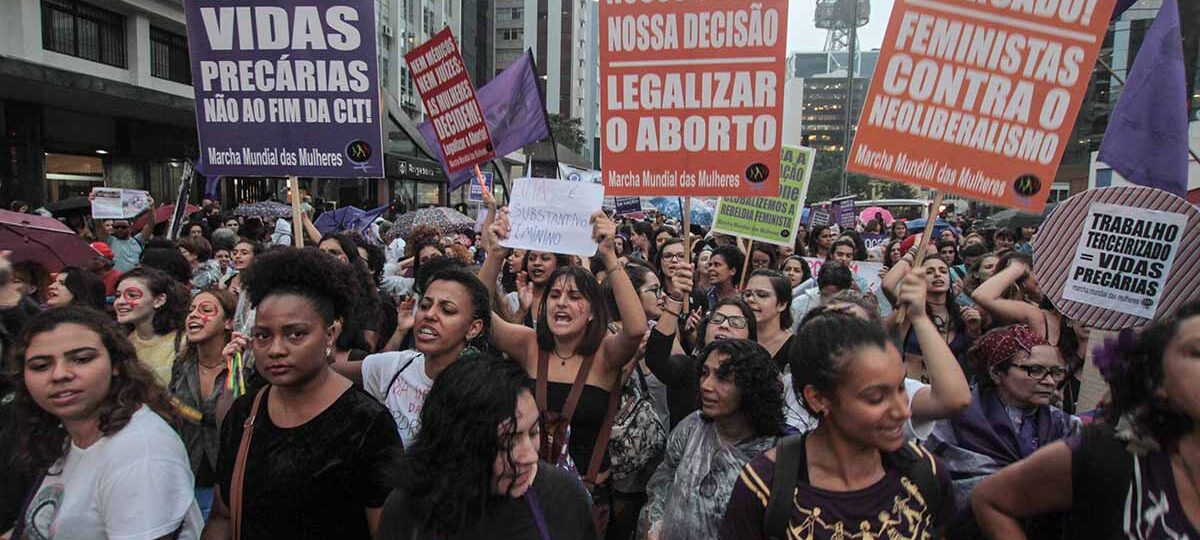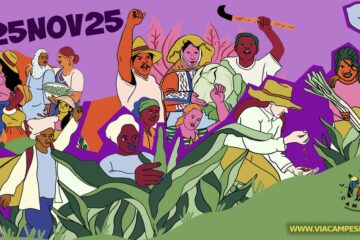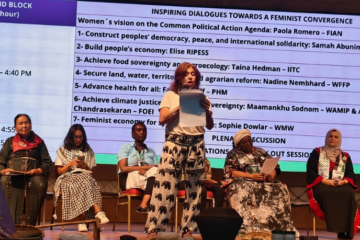April 24th is a day of struggle for the global feminist movement, as it marks the International Day of Feminist Solidarity Against the Power of Transnational Corporations, a day of action called by the World March of Women. It is a date to remember the death of more than one thousand workers, most of them women, in the tragic collapse of the Rana Plaza industrial complex in Bangladesh, on April 24th, 2013. The long and intense work shifts, the lack of labor rights, and the poor structural conditions of the building were signs that already pointed to the criminal tragedy in those sweatshops that produced clothes for transnational textile companies including Walmart and Benetton.
To contribute to debates about the power of transnational corporations and their political impact on the Global South, we share excerpts from the report Transnational Corporations and the Far Right in Latin America, produced by the Labor Observatory of the Americas, which is connected to the Trade Union Confederation of the Americas (TUCA-CSA). The document analyzes the connections between corporate power, labor and environmental exploitation, and the rise of neoliberalism and far-right agendas, which are anti-feminist and threaten democracies.
The report reflects on the new “forms” of coups d’état staged in countries such as Honduras (2009), Paraguay (2012), Brazil (2016), and Bolivia (2019). These coups were part of strategies to reorganize capitalism in the region, through alliances between political elites and national and international economic powers. In many ways, transnational corporations represent a threat to the sovereignty of the people.
The TUCA-CSA report outlines the main activities of transnational corporations in Latin America and their links with the political contexts of each country. Through their exploitation of natural resources, these corporations are responsible for deforestation, pollution, violence, and conflicts with local and traditional communities. They also spearhead major infrastructure and energy projects, pushing for privatization, deregulation, and weakened state intervention, along with more precarious working conditions. Moreover, the intensive operations of telecommunications and technology corporations rely on labor exploitation through digital platforms, using a rhetoric of flexibility to mask the denial of workers’ rights.
In the textile industry, transnational corporations exploit cheap labor under poor conditions and benefit from tax incentive policies. One example is Honduras, where “the textile industry thrived under a free trade zone model that benefits US and Asian transnational corporations. The maquilas in cities like San Pedro Sula produce clothes for international brands, driven by tax incentives and flexible labor regulations.” This strategy escalated after the coup and during the successive right-wing administrations running the government, perpetuating “inequalities and economic dependency in the country.”
*
Global Production Chains and the Renewal of Neoliberalism in Latin America
Global production chains (GPCs) are a key component of neoliberalism, and Latin America has been a highly significant territory in the process of international division of labor. (…) GPCs are made up of transnational corporations led by a parent company based in a country of the Global North. This parent company not only controls and manages a global production chain, but also oversees production, defines the value of products, and makes decisions about their marketing and distribution, encouraging outsourcing of several stages of these processes to other firms.
GPCs promote differentiation between countries, as each is inserted differently into the global economy. In Latin America, transnational corporations transfer the social, environmental, and labor burdens—as well as the threats to democratic organizations and institutions—to countries in the Global South.
A striking example in Latin America is the United Fruit Company, now Chiquita Brands International, a US-based transnational that established itself in Central America and controlled the production and marketing of tropical fruits. This company held significant political and economic power and even supported several coups in the region.
In the labor world, transnational corporations promote informal, temporary, and precarious work in our countries. They implement intensified labor practices with strict activity control, goal imposition, long working hours, poor health and safety protection, low wages, and limited collective bargaining and union organization.
GPCs can be seen as a response by transnational corporations to the limitations imposed on the free market economy by neoliberalism. In this sense, they have been central to a series of measures aimed at reducing the productive and regulatory capacity of the state. When their political allies do not win elections, transnational corporations often work to deteriorate or collapse democratic systems. This model has reshaped the profile of workers and limited the action of unions and labor regulation institutions.
In recent years, transnational corporations have played a crucial role in dismantling national and regional production chains, such as the oil production chain in Latin America. Their main areas of operation in the region include key sectors like metals, energy, meat, and agricultural products.
Final Considerations
(…) First, the renewed—yet more radical—version of neoliberalism promoted by the far right reinforces and deepens anti-state ideas, discourses, and policies, consolidating the primacy of the market over the state. This approach not only weakens the ability of public institutions to regulate and redistribute wealth, but also legitimizes structural inequalities by prioritizing economic interests over social well-being.
Second, it is crucial to reopen the debate about the relationship between money and politics, a connection made clear in examples like the relationship between Trump and Musk, which symbolizes how neoliberalism acts as a bridge between the far right and transnational corporations. This document discussed the emergence and consolidation of the far right in Latin America, exploring the new patterns and interactions it establishes with global corporations—marked by shared interests that promote deregulation and the concentration of economic power.
The agenda of transnational corporations aligns with that of the far right, as both prioritize capitalist profit, even at the cost of eroding democracies. One of the most significant impacts of this alliance is felt in the labor world, where financial deregulation weakens social security systems, while labor deregulation directly undermines workers’ collective rights, making their working and living conditions more precarious.
This approach not only deepens social inequalities, but also restricts the possibilities for union organization and collective bargaining, which are essential to balancing power relations between employers and employees. In this context, it is essential to rethink regulatory models that prioritize social well-being over the interests of an overly concentrated economy.
(…) The triumph of Trump marked the beginning of a new phase for the transnational far right—one characterized by greater boldness and lack of disguise: transnational capital now openly promotes its agenda, pushing for policies that enhance its economic and political power. In this scenario, sociopolitical union movements face the challenge of deeply understanding the nature and strategies of this global actor. A precise diagnosis is not just necessary, but urgent, in order to develop effective responses that protect labor rights, social justice, and democratic values in the face of an increasingly organized and globalized offensive.




